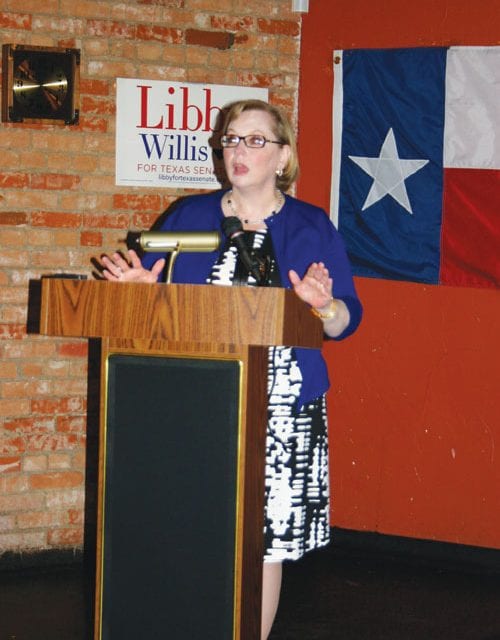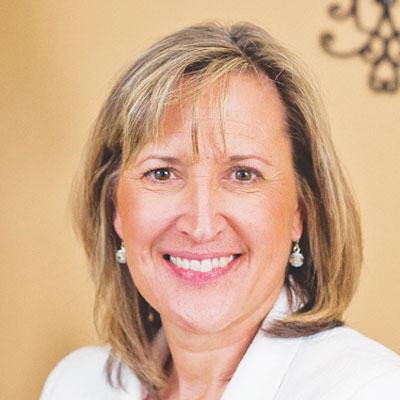Republicans near super majority in state Senate, increase their margin in the House by 3
 Election Night, Tuesday, Nov. 4, couldn’t have gotten any better for Texas Republicans. The party swept statewide offices and fell just two seats shy of a supermajority in the state House.
Election Night, Tuesday, Nov. 4, couldn’t have gotten any better for Texas Republicans. The party swept statewide offices and fell just two seats shy of a supermajority in the state House.
But when Republican Konni Burton bested Democrat Libby Willis for the open Senate District 10 seat in Tarrant County before 11 p.m., the Colleyville Tea Party activist gave Republicans their biggest prize: a near super majority in the state Senate.
Sen.-elect Burton, like her fellow Senate freshmen, bested an establishment Republican in the March primary and a May runoff. She beat former Rep. Mark Shelton, the preferred choice of Tarrant County Republicans to win the GOP nomination, before defeating Willis on Tuesday to succeed Sen. Wendy Davis, who lost her bid for Texas governor.
Burton will be joined by a handful of hard-core conservative freshman legislators, including Sens.-elect Don Huffines and Bob Hall, both of whom who successfully ran to the right of incumbent Sens. John Carona and Bob Duell.
As part of their campaigns, both Hall and Huffines opposed any form of pro-LGBT legislation.
In the SD-10 match up, LGBT issues were not explicitly mentioned until a mailer from the National Family Council hit voters’ mailboxes. It blasted Willis for having the support of the LGBT community.
At the time, Burton spokesperson Luke Macias denied any affiliation with the mailer. An investigation by Dallas Voice later found that to be false. (When asked by the political newsletter Quorum Report if the mailer was homophobic, however, Macias declined to comment.)
With House Democrats clinging to 52 seats and Senate Democrats stuck with only 10, what does that mean for pro-LGBT legislation in the Senate?
“It’s anybody’s guess,” said Daniel Williams, field organizer and legislative specialist with Equality Texas.
In the past Democrats were able to use what is known as the two-thirds rule, meaning if all eleven Democrats opposed legislation, the Republican majority would have to compromise. But Lt. Gov.-elect Dan Patrick, another hardcore conservative, has called for the rule’s elimination.
If Patrick wins that battle, “We will need to be more persuasive,” Williams said.
But the outlook isn’t not all doom and gloom, Williams said: “It’s doable. We’ve done it in the past.” And it helps the climate in the Texas House is also changing.
“There are a lot of freshmen and sophomores [in the Texas House] who are more vocal and less opposed to LGBT issues,” he said. If nothing else, the lower chamber should not be stridently opposed to pro-LGBT bills.
Williams cited incoming members Reps.-elect Cesar Blanco, D-El Paso, and Linda Koop, R-Dallas. Aside from Rep. Lon Burnam, D-Fort Worth, who was defeated in his primary re-election by Rep.-elect Ramon Romero, D-Fort Worth, all of the House’s pro-LGBT advocates are returning.
Despite the widespread dismay among progressives, including those in the LGBT community, James Riddlesperger, a professor of political science at Texas Christian University, said Tuesday’s election results really do not change much. The already conservative legislative body really couldn’t have gotten any more conservative, he said.
“Ninety percent of government commitments are the same, regardless of your party,” Riddlesperger said. “Everyone wants good infrastructure, good schools and clean water. Everyone wants an efficient government.”
Even a new and more conservative Senate needs to pass legislation.
In both the House and Senate, the rhetoric among more conservative members may be louder and more heated. But they’re in the minority. Even with a more activist conservative Republican caucus in the Senate, the temperament should remain the same. Just as in the past, Riddlesperger expects “a chilling session for LGBT rights.”
The real test for social issues will come when the Legislature convenes in January, though. Besides deciding the fate of the Senate’s two-thirds rule, some of the first issues legislators must face concern recent court rulings striking down portions of the state’s strict new anti-abortion law and ban on same-sex marriage.
To Riddlesperger, a Willie Nelson song summed up the new legislature: “What can they do now they haven’t done already?”
……………………………
Right-wing influence
The “archconservative cabal” has been victorious with a clean sweep in Texas.
Efforts by an ultra-right-wing group to elect Republicans paid off. All of the targeted Democrats lost their elections, including Democrat Libby Willis in Senate District 10.
Campaign finance records reveal Luke Macias consulted all but one of the prevailing Republicans, including Willis’ opponent, Tea Party darling Konni Burton. It was in that race where one of the groups — the National Family Council — mailed out anti-gay flyers targeting Willis in the final weeks of the campaign. (Visit DallasVoice.com for our expose on the mailer and the network of organizations, posted earlier this week.)
Meanwhile, both Colorado Senate races targeted by the right-wing organizations remained too close to call, even two days after the election. Democratic Sen. Rachel Zenzinger was trailing Republican Laura Woods, while Democratic Sen. Andy Kerr was ahead of Republican Tony Sanchez.
The question remains if last minute mail dumps by NAGR, NFC and others pushed the Republicans to victory or if a national wave contributed to the Republicans edge.
Colorado is seen as a swing state. Coloradians narrowly re-elected the incumbent Democratic governor but ousted Democratic Sen. Mark Udall.
If Colorado is purple, then Texas is solidly red, with Democrats walloped in statewide elections. Regardless, a new group of powerful hard right Republican operatives have officially landed in Texas.
— James Russell
This article appeared in the Dallas Voice print edition November 7, 2014.



